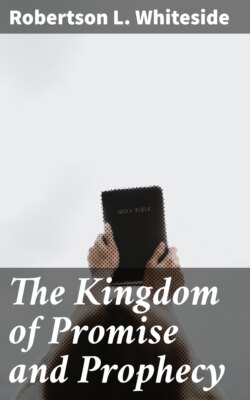Читать книгу The Kingdom of Promise and Prophecy - Robertson L. Whiteside - Страница 19
На сайте Литреса книга снята с продажи.
MATTHEW 16:28 EXPLAINED
ОглавлениеTable of Contents
Please explain Matt. 16:28. I have to contend with the Boll theory. What I want to know is how the disciples were to “see” the Son of man coming in his kingdom.—W. C. Anderson.
Matthew 16:28.
“Verily I say unto you, There are some of them that stand here, who shall in no wise taste of death, till they see the Son of man coming in his kingdom.”
In this verse it is stated that some would taste of death—some of them would see the Son of man coming in his kingdom. Taste and see—are these terms used literally? A little study of both words will help. “Oh taste and see that Jehovah is good.” (Ps. 34:8.) “Sweet are thy words unto my taste.” (Ps. 119:103.) “Tasted of the heavenly gift”; “tasted the good word of God.” (Heb. 6:4, 5.) If you make see represent the actual functioning of one of the five senses, why not make taste do the same? No man actually tastes death as he tastes food. The future-kingdom folks stress giving words their literal meaning, but even they will not say that a man tastes Jehovah, his word, or death, as he tastes food. So also the word see has a variety of meanings, or uses. To see often means to know. “Taste and see (know) that Jehovah is good.” To see often means to experience. We see joy and we see a good time; we see trouble and sorrow. Taste death—experience death, or suffer death. The parallel passages, Mark 9:1 and Luke 9:27, say: “Verily I say unto you, There are some of them that stand by, who shall in no wise taste of death, till they see the kingdom of God come with power.” “But I tell you of a truth, There are some of them that stand here, who shall in no wise taste of death till they see the kingdom of God.” To see the Son of man coming in his kingdom and to see the kingdom of God come with power and to see the kingdom of God are different expressions of the same idea. When the kingdom of God came with power, it was Christ coming in his kingdom. Just as certain as some of those standing by would die before the kingdom came, or the Son of man came in his kingdom, just that certain some would live till that event occurred. Ye—those standing by, not those of some future date—shall see the Son of man coming in his kingdom, or see the kingdom of God come with power, and they would see it before they died. The future-kingdom folks do not see that part of what Jesus said; they see only “see the Son of man coming in his kingdom.” And yet no man literally sees a kingdom, as he sees a material object; for the “kingdom of God cometh not with observation”—that is, not in such a manner that it can be watched with the eyes; i. e., in a visible manner. (Luke 17:20.) Jesus made that statement in answer to the Pharisees’ question as to when the kingdom of God would come. Hence, some of the disciples to whom Jesus was talking would see Jesus coming in his kingdom; yet they would not see with their eyes. Jesus himself declared that his kingdom would not come in that manner.
The future-kingdom folks put stress on the statement: “They shall see the Son of man coming on the clouds of heaven with power and great glory.” But notice the change in pronouns—“ye shall see,” “they shall see.” They tell us that this coming on the clouds will be when he comes in his kingdom. They also tell us that when he thus comes the wicked dead will not see him, for they will not be raised till the end of a thousand years. But there is a hitch in that. Certainly the high priest who condemned Jesus to death belongs in the class of the wicked dead yet Jesus said to him and to the court: “Ye shall see the Son of man sitting at the right hand of Power, and coming on the clouds of heaven.” Notice the word henceforth—from now on. Notice, too that this wicked court was henceforth to see the Son of man sitting on the right hand of power. No man sees him sitting with his natural eye. The word see here has two objects, sitting and coming; or, rather, the same persons shall see Jesus sitting and coming. Even a child should be able to see that the word see could not here mean a mental conception as to one of its objects and an actual seeing with the eyes as to the other object. A word may have several meanings, but it cannot have two meanings at one and the same time. As some of the disciples then living were to see Jesus coming in his kingdom and the Sanhedrin were to see him sitting on the right hand of power, the Lord came in his kingdom during the lifetime of these people.
